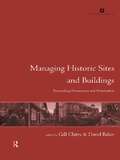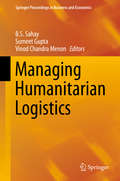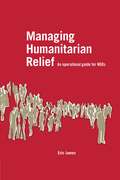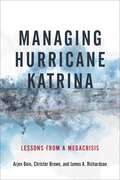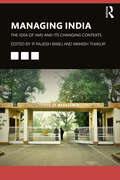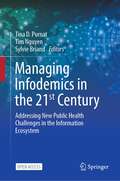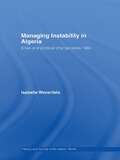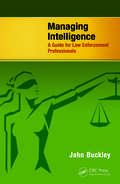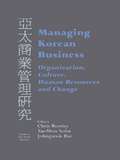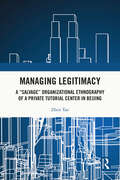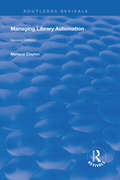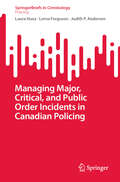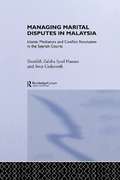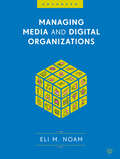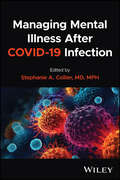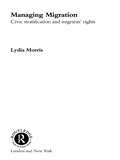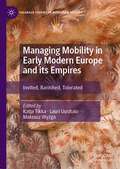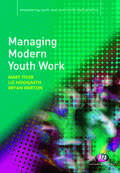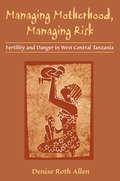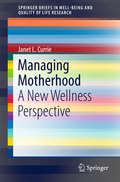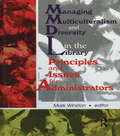- Table View
- List View
Managing Historic Sites and Buildings: Reconciling Presentation and Preservation (Issues in Heritage Management)
by David Baker Gill ChittyManaging Historic Sites and Buildings looks at the choices and the tensions that exist in conservation and interpretation of the heritage. Preservation and presentation are central activities, arguably means and ends in the conservation of the historic environment. But are they self-reinforcing or do they work against each other? In a series of essays which span form prehistoric sacred site to Second World war military remains, from medieval monastery to 1970s housing estate, we look at contemporary concerns and debates about the way the past is shaped, physically and metaphorically , by these two aspects of heritage management.Starting from the position that the fundamental purpose of the whole process is to communicate understanding about the human past, these essays examine how far the ideologies, strategies, tactics and techniques of preservation and presentation are mutually supportive. the success of integrated approaches that are inclusive of social, economic and green environmental concerns is understood, but the value of developing truly sustainable management for individual historic places is only just becoming evident. At the heart of such an approach lies a crucial relationship between the activity of preserving historic places and of promoting understanding of their significance.
Managing Humanitarian Logistics
by B. S. Sahay Sumeet Gupta Vinod Chandra MenonThis book discusses emerging themes in the area of humanitarian logistics. It examines how humanitarian logistics and supply chains play a key role, focusing on rapidly delivering the correct amount of goods, people and monetary resources to the locations needed to achieve the success of relief efforts in response to global emergencies such as flood, earthquakes, wars etc. With an increase in the frequency, magnitude and impact of both natural and manmade disasters, effective delivery of humanitarian aid is an issue that is becoming increasingly important in the context of disaster management. The book focuses on how logistics systems and supply chains responsible for delivering this aid from origin to recipients can be made more effective and efficient. It also discusses how the development of information technology systems that can provide visibility to the disaster relief supply chain marks a huge step forward for the humanitarian sector as a whole. As more organizations begin to adopt and implement these systems and visibility is established, the use of key performance indicators will then become essential to further enhance the efficiency and effectiveness of these supply chains.
Managing Humanitarian Relief: An Operational Guide for NGOs
by Eric JamesResponding effectively to humanitarian disasters is far from straightforward, and relief workers often find themselves working in competitive situations or at cross purposes with other agencies. Managing Humanitarian Relief is aimed at relief workers charged with putting together a program of action to help people in extreme crisis. It provides humanitarian relief managers with a single comprehensive reference for all the management issues they are likely to encounter in the field. The book is organized in two parts. First, it provides an outline of different relief programming sectors: food and nutrition, health, water and sanitation, and shelter. Second, it presents 20 separate management topics that are essential for overseeing programs. Its easy-to-use format includes checklists, tables, diagrams, sample forms, and no-nonsense tips from practitioners to help readers in emergency situations.
Managing Hurricane Katrina: Lessons from a Megacrisis
by Arjen Boin Christer Brown Professor James A. RichardsonThe government’s response to Hurricane Katrina, one of the most devastating natural disasters in U.S. history, suffered numerous criticisms. Nearly every assessment pointed to failure, from evaluations of President George W. Bush, FEMA, and the Department of Homeland Security to the state of Louisiana and the city administration of New Orleans. In Managing Hurricane Katrina: Lessons from a Megacrisis, Arjen Boin, Christer Brown, and James A. Richardson deliver a more nuanced examination of the storm’s aftermath than the ones anchored in public memory, and identify aspects of management that offer more positive examples of leadership than bureaucratic and media reports indicated. Katrina may be the most extensively studied disaster to date, but the authors argue that many academic conclusions are inaccurate or contradictory when examined in concert. Drawing on insights from crisis and disaster management studies, Boin, Brown, and Richardson apply a clear framework to objectively analyze the actions of various officials and organizations during and after Katrina. They specify critical factors that determine the successes and failures of a societal response to catastrophes and demonstrate how to utilize their framework in future superdisasters. Going beyond previous assessments, Managing Hurricane Katrina reconsiders the role of government in both preparing for a megacrisis and building an effective response network at a time when citizens need it most.
Managing India: The Idea of IIMs and its Changing Contexts
by R Rajesh Babu and Manish ThakurThis book explores the history and metamorphosis of the Indian Institutes of Management (IIMs), the premier business and management schools in India, and their significance within the changing landscape of higher education, nation-building and socio-economic development in the country. Over the past decades, IIMs, as institutions, have recalibrated their goals and priorities to address contemporary challenges in a globalised world, changing aspirations of a rapidly growing population and the changing idea of India. This book examines different facets of the challenges the institutes have faced in the aftermath of independence. These include the challenges of effective institutional governance; ensuring equity and access; democratisation; raising the bar for teaching and research; addressing national imparities and global benchmarking; accreditation and ranking; and academia, industry, and employability. Drawing upon the interplay of the experiential and analytical, the contributors to the volume also engage with the Indian knowledge system and the contested terrain of global theory and research. This volume will be of interest to scholars, researchers and practitioners of education, management studies, academic administration, and policymaking in the field of higher education.
Managing Inequality: Northern Racial Liberalism in Interwar Detroit
by Karen R. MillerIn Managing Inequality, Karen R. Miller examines the formulation, uses, and growing political importance of northern racial liberalism in Detroit between the two World Wars.In the wake of the Civil War, many white northern leaders supported race-neutral laws and anti-discrimination statutes. These positions helped amplify the distinctions they drew between their political economic system, which they saw as forward-thinking in its promotion of free market capitalism, and the now vanquished southern system, which had been built on slavery. But this interest in legal race neutrality should not be mistaken for an effort to integrate northern African Americans into the state or society on an equal footing with whites. During the Great Migration, which brought tens of thousands of African Americans into Northern cities after World War I, white northern leaders faced new challenges from both white and African American activists and were pushed to manage race relations in a more formalized and proactive manner. The result was northern racial liberalism: the idea that all Americans, regardless of race, should be politically equal, but that the state cannot and indeed should not enforce racial equality by interfering with existing social or economic relations. Miller argues that racial inequality was built into the liberal state at its inception, rather than produced by antagonists of liberalism. Managing Inequality shows that our current racial system—where race neutral language coincides with extreme racial inequalities that appear natural rather than political—has a history that is deeply embedded in contemporary governmental systems and political economies.
Managing Infodemics in the 21st Century: Addressing New Public Health Challenges in the Information Ecosystem
by Tina D. Purnat Tim Nguyen Sylvie BriandThis open access book on infodemic management reviews the current discussions about this evolving area of public health from a variety of perspectives. Infodemic management is an evidence-based practice underpinned by the science of infodemiology that offers guidance to better manage pandemic and epidemic risks and more quickly tackle new and resurgent health threats. Infodemic management has added much visibility and recognition for the importance of social-behavioural sciences, health communication, participatory and human-centered approaches, and digital health as complementary scientific and practical approaches that also must be strengthened in public health practice through a whole-of-society and whole information ecosystem approach. This volume makes a case that health of the information ecosystem in the digital age has emerged as the fourth ecosystem that public health is challenged by, along with the triad of environment-human-animal health. The book brings together scientists and practitioners across disciplines to offer insights on infodemic management. The tools, methods, analytics, and interventions that they discuss in the context of acute health events also can be applied to other public health areas. Topics covered include: People's Experience of Information Overload and Its Impact on Infodemic HarmsSmart Health! Expanding the Need for New LiteraciesTo Debunk or Not to Debunk? Correcting (Mis)informationPartnering with Communities for Effective Management of Health Emergencies Managing Infodemics in the 21st Century is required reading for public health practitioners in need of an overview of this evolving field of practice that has made major scientific and practical leaps forward since early 2020. Global, regional, and local health authorities are increasingly recognizing the need to expand their capacities for infodemic management in their efforts to better prepare for future health emergencies. This book is the resource they need to build toward a mature infodemic management process. The text also can be used as supplemental reading for graduate programs and courses in public health.
Managing Instability in Algeria: Elites and Political Change since 1995 (History and Society in the Islamic World)
by Isabelle WerenfelsThis topical new book seeks to understand the relationship between elite dynamics and strategies and the lack of profound political change in Algeria after 1995, when the country’s military rulers returned to electoral processes. Using evidence from extensive fieldwork, Isabelle Werenfels exposes successful survival strategies of an opaque authoritarian elite in a changing domestic and international environment. The main focus is on: the changing balance of power between different elite segments the modes of generation change and the different emerging young elite types constraints, obligations and opportunities arising from elite embeddings in clienteles networks and in specific social and economic structures. Building rare evidence from fieldwork into a multidisciplinary analytical framework, this book presents a significant input to the more general literature on transition processes and is particularly relevant as the West pushes for democratic reforms in the Middle East and North Africa.
Managing Intelligence: A Guide for Law Enforcement Professionals
by John BuckleyManaging Intelligence: A Guide for Law Enforcement Professionals is designed to assist practitioners and agencies build an efficient system to gather and manage intelligence effectively and lawfully in line with the principles of intelligence-led policing. Research for this book draws from discussions with hundreds of officers in different agencies, roles, and ranks from the UK, United States, Australia, New Zealand, and Canada. Highlighting common misunderstandings in law enforcement about intelligence, the book discusses the origins of these misunderstandings and puts intelligence in context with other policing models.
Managing Joint Innovation
by Francis BidaultJoint innovation between different organizations or groups has become a common practice for the many companies confronted with major shifts in customers' demand and new technological possibilities. These co-development alliances, however, are typically unstable, and regularly result in drastic restructuring as the partners learn to work together and confront unexpected difficulties. This new and innovative book takes a fresh look at the critical task of managing relationships and communication in co-development alliances. Good relational quality management will certainly not compensate for bad business strategies and poor execution of initiatives. But, at the same time, outstanding relationships will not survive when there is a lack of trust between partners and a desire for tighter control over one another. Francis Bidault presents a new framework for understanding the dynamics of alliances and for managing the relationship between partners at all levels, with practical tools to help successfully develop joint innovation initiatives.
Managing Korean Business: Organization, Culture, Human Resources and Change (Studies In Asia Pacific Business)
by Chris Rowley Johngseok Bae Tae-Won SohnDuring the 1990s the Korean economy was regarded as a possible "role model" to be followed by other newly industrializing economies, but the "Asian Crisis" of 1997 destroyed this image. Past practices, challenges and responses are explored in this collection by an international group of authors.
Managing Legitimacy: A “Salvage” Organizational Ethnography of a Private Tutorial Center in Beijing
by Zhen TaoFrom an out-of-school perspective, the book studies private supplementary tutoring, also widely known as shadow education within the Chinese education landscape.The author presents an organizational ethnography of Smart English, a private English tutoring center in Beijing. Using the concept of “organizational legitimacy” from organizational institutionalism as its framework, the study provides a detailed account of the center’s daily operations. It examines how the organization manages its legitimacy while navigating regulations, providing private supplementary tutoring, and addressing public skepticism. The book documents the typical operations of such institutions in Chinese mainland before stringent regulations disrupted their activities, serving as a “salvage” record.This book enriches educational ethnographies and will appeal to academics of shadow education, Chinese education, and ethnography.
Managing Library Automation: Second Edition (Routledge Revivals)
by Marlene ClaytonFirst published in 1992, Managing Library Automation provides a concise, easy-to-read guide to the main factors which librarians and information workers should be aware of when considering computerization. This second edition has been revised and updated with the assistance of Chris Batt to ensure a fresh perspective. The book retains, however, its original brief of not attempting to cover every detail of an extensive topic, but instead, gives the essential facts and indicates significant trends. Historical accounts have been kept to the minimum and no attempt has been made to describe or explain computing techniques except where an understanding of these assists the effective use of systems by librarians. References to further reading are given where appropriate. The book begins by setting library automation within the context of a wider strategy for the use of Information Technology. The importance of careful planning – the first skill of management – is stressed. Subsequent chapters explore the ‘nuts and bolts’ of hardware and software and reveal some of the more significant changes that have now taken place in the five years since the previous edition was published. The ‘human’ aspect of automation is considered throughout the book. Although a more commonplace activity than five years ago, the successful integration of automation into the total library system is still a considerable managerial achievement.
Managing Life Skills
by McGraw-Hill EducationManaging Life Skills builds students’ independent living skills and prepares them for success beyond high school. Throughout the course, students will prepare for independent living, develop interpersonal and management skills, recognize healthy food choices.
Managing Madness: Weyburn Mental Hospital and the Transformation of Psychiatric Care in Canada
by Tracey Mitchell Erika Dyck Alexander Dyck John Mills Alex Deighton Hugh Lafave John Elias Gary GerberThe Saskatchewan Mental Hospital at Weyburn has played a significant role in the history of psychiatric services, mental health research, and providing care in the community. Its history provides a window to the changing nature of mental health services over the 20th century. Built in 1921, Saskatchewan Mental Hospital was considered the last asylum in North America and the largest facility of its kind in the British Commonwealth. A decade later the Canadian Committee for Mental Hygiene cited it as one of the worst facilities in the country, largely due to extreme overcrowding. In the 1950s the Saskatchewan Mental Hospital again attracted international attention for engaging in controversial therapeutic interventions, including treatments using LSD. In the 1960s, sweeping healthcare reforms took hold in the province and mental health institutions underwent dramatic changes as they began transferring patients into communities. As the patient and staff population shrunk, the once palatial building fell into disrepair, the asylum’s expansive farmland went out of cultivation, and mental health services folded into a complicated web of social and correctional services. Erika Dyck’s "Managing Madness" examines an institution that housed people we struggle to understand, help, or even try to change.
Managing Major, Critical, and Public Order Incidents in Canadian Policing (SpringerBriefs in Criminology)
by Laura Huey Lorna Ferguson Judith P. AndersenThis brief examines Canadian police incident command response teams&’ process of decision-making during major, critical, and public order events. It explores the different factors that influence how police Incident Commanders (ICs) approach their work, and demystifies this work and how it is organized and operationalized. The chapters in this book detail: • The basics of how incident command is structured in Canada. • How incident command models in Canada relate to those in other countries. • Overviews of the training and responsibilities for different incident command types. • First-hand accounts of how ICs approach their work and feel about the decisions they have to make. This book is ideal for practitioners and policymakers who are interested in how this mode of policing works. It is also suitable for policing students in upper-level criminology and criminal justice courses curious about this potential line of work.
Managing Marital Disputes in Malaysia: Islamic Mediators and Conflict Resolution in the Syariah Courts (Nias Monographs In Asian Studies #No.75)
by Sven Cederoth Cederroth Sharifa Zaleha HassanA trend found in many Islamic societies in recent years has been the increasing regulation of family life by Islamic law and a corresponding move away from customary law and informal conflict resolution procedures. The situation in Malaysia, particularly in urban Malay society, is no exception here. Several studies already exist of the nature and extent of Malaysia's Islamic judicial system but the general tendency has been to ignore the actual operation of the syariah courts and related institutions. This study addresses this need with an in-depth analysis of the key area of intra-family conflict and demonstrates that, although formally the counsellor, kadi and judge have defined roles for conflict resolution, in practice much flexibility is evident in the use of consultation, conciliation, mediation, arbitration and adjudication techniques. This study will be of special interest to legal anthropologists and those scholars interested in the increasing application of Islamic law in many different countries.
Managing Media and Digital Organizations
by Eli M. NoamWhat does it take for success in the media business? Creativity, innovation, and performance, of course. Plus experience and good judgment. However, it also requires an understanding of the principles and tools of management. This book summarizes the major dimensions of a business school curriculum and applies them to the entire media, media-tech, and digital sectors. Its chapters cover—in a jargonless, non-technical way—the major management functions. First, creating a media product: the financing of projects and the management of technology, HR, production operations, intellectual assets, and government relations. Second, harvesting the product created: market research, marketing, pricing, and distribution. And third, is the control loop: media accounting and strategy planning. The book’s interdisciplinary approach goes beyond an industry-by-industry coverage and centers around management functions. In the process, this book becomes an indispensable resource for those aiming for a career in the media and digital field, both in startups and established organizations. It is also a work that helps advance the entire field—the management of information resources and products—to a more central role in business analysis. This book is designed to help those already in the sector or those joining it to become creative managers and managerial creatives. It aims to make managers in this field more knowledgeable, less blinded by hype, more effective, more productive, and more responsible.
Managing Mental Illness After COVID-19 Infection
by Stephanie A. CollierA concise, practical guide to the mental health effects of COVID-19 and its treatments Managing Mental Illness After COVID-19 Infection is a resource for people affected by COVID-19 and their loved ones. As the long-term effects, especially the psychiatric effects, evolve and become more common, people are increasingly searching for answers. This book reviews presentations and treatments for mental illnesses post-COVID-19. Readers will learn about the use of medications, supplements, and behavioral interventions to address these conditions. This engaging and practical book includes numerous tables and other illustrations for easy reference. It provides enough medical detail for patients and their caregivers to better understand the symptoms they may experience, as well as the best ways to investigate and treat those symptoms. However, it is not too complex for the general reader, making it perfect as a standalone book for patients and their families. Learn how and why many people struggle with mental illness following COVID-19 infection Discover what your symptoms may indicate and get advice on how to pursue diagnosis and treatment Find a doctor who can understand and manage the mental and behavioral consequences of COVID-19 Get up to speed on the psychiatric and psychosocial effects of COVID-19 infection This is an excellent resource for the public, policymakers, clinicians, counselors, social workers, and behavioral health coaches that could benefit from the latest research on the psychiatric effects of COVID-19.
Managing Migration: Civic Stratification and Migrants Rights
by Lydia MorrisNation States now increasingly have to cope with large numbers of non-citizens living within their borders. This has largely been understood in terms of the decline of the nation state or of increasing globalisation, but in Managing Migration Lydia Morris argues that it throws up more complex questions. In the context of the European Union the terms of debate about immigration, legislation governing entry, and the practice of regulation reveal a set of competing concerns, including: *anxiety about the political affiliation of migrants *a clash between commitment to equal treatment and the desire to protect national resources *human rights obligations alongside restrictions on entry. The outcome of these clashes is presented in terms of an increasingly complex system of civic stratification. The book then moves on to examine the way in which abstract notions of rights map on to lived experiences when filtered through other forms of difference such as race and gender. This book will be essential reading for students and researchers working in the areas of migration and the study of the European Union.Lydia Morris is Professor of Sociology at the University of Essex.
Managing Mobility in Early Modern Europe and its Empires: Invited, Banished, Tolerated (Palgrave Studies in Migration History)
by Katja Tikka Lauri Uusitalo Mateusz WyżgaThis book examines how migration and mobility were controlled, supported, and restricted in early modern Europe and European colonies. The aim of the book is to investigate how different actors, such as rulers, regional lords, local authorities, and corporations tried to regulate different forms of mobility and how those on the move reacted to these attempts. The book examines the agency of both the authorities and the migrants, shifting focus between the macro and the micro level. The chapters will also illuminate the ways gender, religion, language, ethnicity, occupation, and socioeconomic status were entangled in the regulations concerning mobility. Control of migration is inextricably linked with power relations. In this book, mobility is seen as a wide social process, which covers daily or seasonal movement as well as less or more stable migration.
Managing Modern Youth Work (Empowering Youth and Community Work PracticeýLM Series)
by Mary Tyler Bryan Merton E A HoggarthWhen people set out to qualify in youth work they do not anticipate that it′s about managing themselves; aims, intentions and outcomes; programmes and projects; case work; educational experiences and environments; budgets; volunteers and staff; and young people′s development. This book ensures that students will feel confident to manage purpose, projects and people to deliver good- quality educational and developmental youth work with and for young people. It also caters for those with youth work management experience by providing an opportunity to review and further develop management skills and understanding in the context of a volatile policy environment.
Managing Motherhood, Managing Risk: Fertility and Danger in West Central Tanzania
by Denise Roth AllenAn investigation of the consequences resulting from fertility-related development interventions in Tanzania
Managing Motherhood: A New Wellness Perspective (SpringerBriefs in Well-Being and Quality of Life Research)
by Janet L. CurrieThis book asserts that women attain higher levels of health in the mothering role when they achieve increased control over their own health, lifestyle and environment. Reflecting the philosophy of health promotion, it explores the meaning of the positive coping experience for new mothers, identifying the essential features of resilience in a new coping model based on ground-breaking analytical techniques. Further, the book discusses preventative strategies for building resilience and quality of life during the period of new motherhood, opening new horizons and dialogues related to what “coping” can actually mean when underpinned by a well-being paradigm.
Managing Multiculturalism and Diversity in the Library: Principles and Issues for Administrators
by Mark WinstonDiscover ways to raise staff awareness regarding diversity!Managing Multiculturalism and Diversity In the Library: Principals and Issues for Administrators is an academic guide to diversity issues such as affirmative action, career development of minorities in the library science profession, racism, and scholarship solutions to increase the diversity of people in the library and information science profession. From this manual, you will gain a deeper understanding of diversity and its implementation in your library. Scholarly and poignant, this book is recommended to academics, administrators, library professionals, and students who want to improve the diversity of libraries and the profession of library information science. In Managing Multiculturalism and Diversity In the Library, you will explore the continued need to keep diversity growing in our libraries as a learning tool to boost the creativity and broaden the knowledge base of libraries as a whole. This informative guide provides you with studies on the diversification efforts of Australia, Canada, China, and the United Kingdom, showing you how each nation differently defines diversity, yet values diversity with an agenda that accepts and encourages cultural differences. You will find suggestions on how to bring in the talents of traditionally excluded groups into your library and examine affirmative action and its dismantling from different angles. Managing Multiculturalism and Diversity In the Library illustrates the importance of cultural diversity in contrast to a melting pot that does not allow for distinct flavors. Some pertinent areas of diversity that you will read about are: raising staff awareness of diversity through training seminars a diversity program focused closely on your library’s missions and strategic plans integrating diversity into every aspect of the library activities looking to colleges and universities as the leaders of cross-cultural understanding American Library Association and the diversity agendaManaging Multiculturalism and Diversity In the Library is an enlightening and helpful resource to foster multicultural understanding and to plan a diversity agenda that is right for your library organization. From this book, you will find many interesting and informative methods on creating a culturally pluralistic library.
